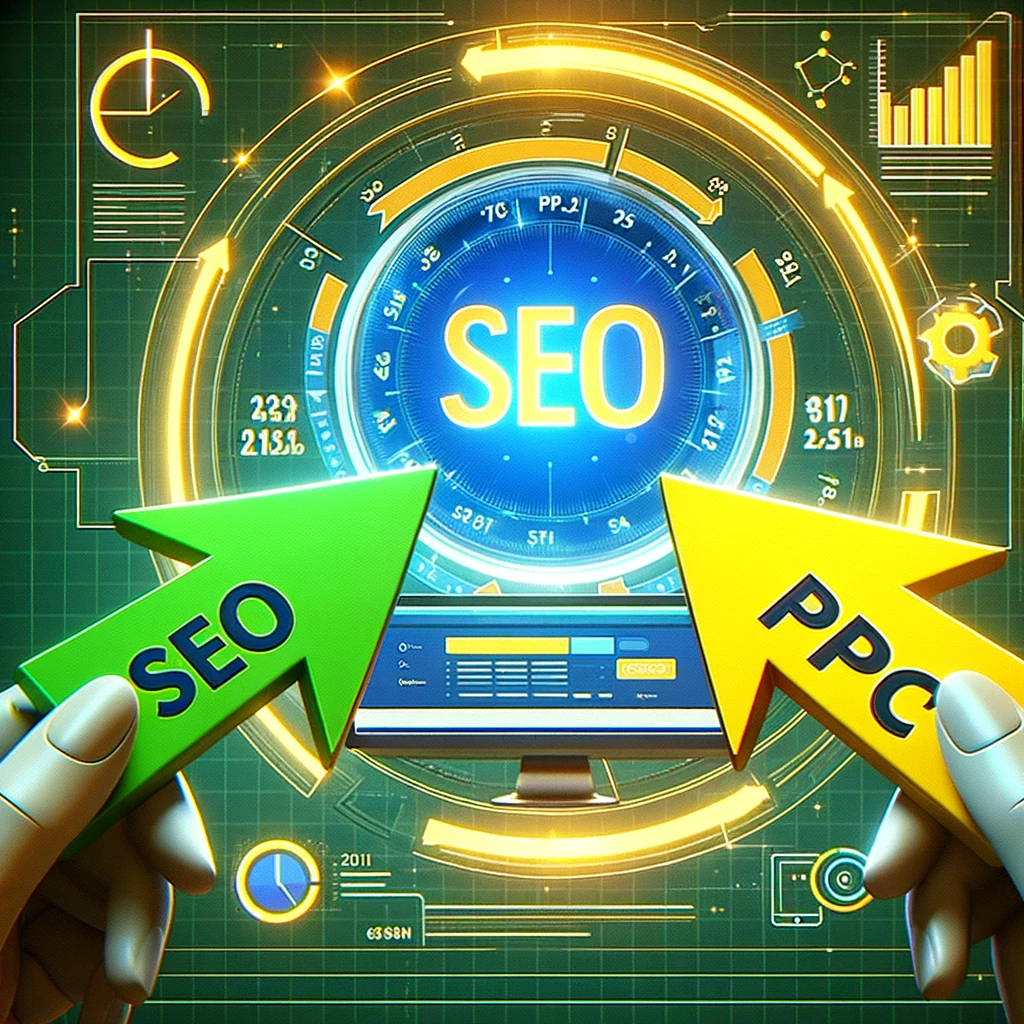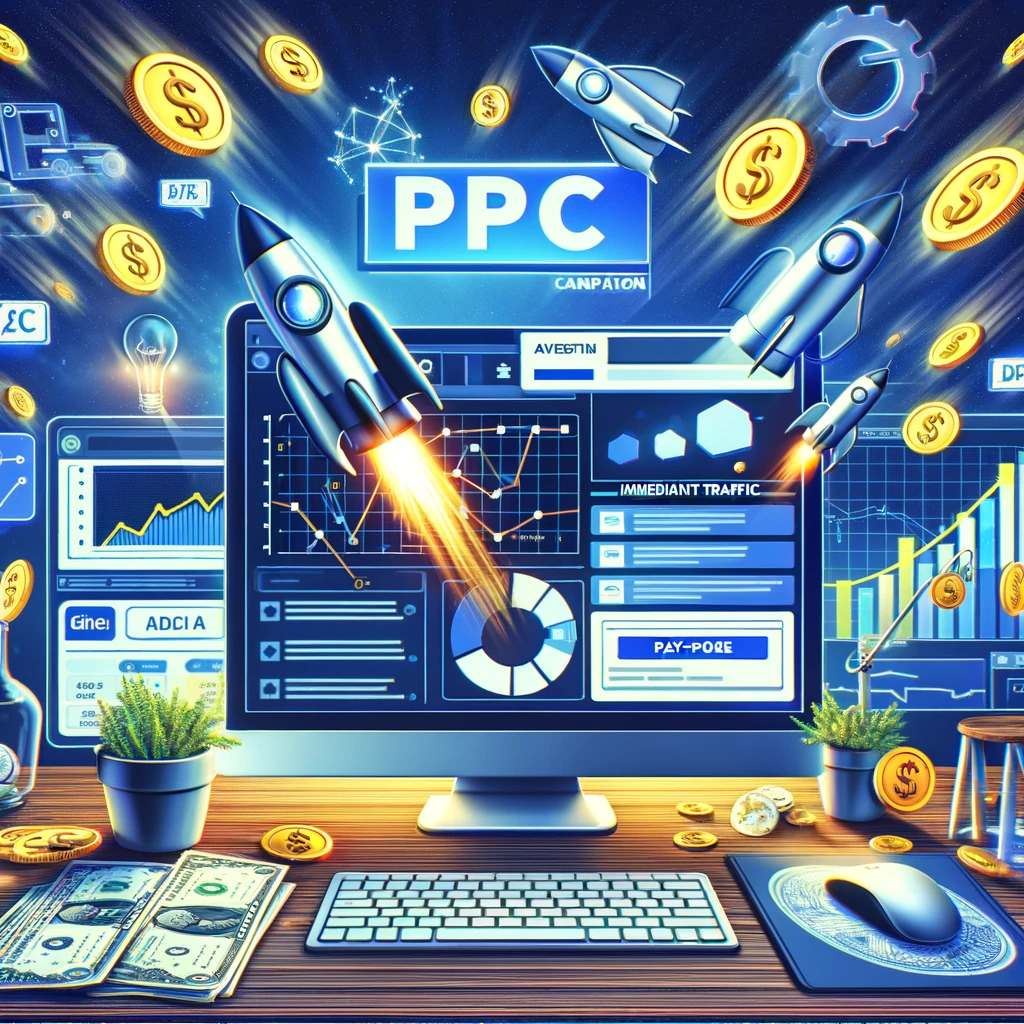In the dynamic realm of digital marketing, the debate of SEO vs PPC is ever-present, inviting brands to weigh the merits and drawbacks of these powerful strategies. Essentially, search engine optimization (SEO) focuses on refining a website to enhance its placement in organic search results. It’s a peon to the algorithmic quirks of modern search engines, playing the long game to accrue sustainable, cost-effective organic traffic to your website.
On the flip side, PPC advertising, also known as Pay-Per-Click, provides targeted visibility with a price tag. Each time a potential customer clicks on a paid ad, the advertiser pays. This way, PPC flings open the doors to immediate traffic, spearheaded by platforms such as Google Ads. Knowing the ins and outs, the pros and cons, of both digital marketing strategies can determine how effectively you can drive traffic and grow your online presence through varied search engine results.
As we peel back the layers, it’s imperative to discern the nuances that tether both search engine marketing tactics together, and when to apply each for maximum impact. Through a lens of well-informed strategy, one can navigate the terrain of keywords, organic and paid search, and the quest to ensure that the journey to your website becomes a frequented path for your intended audience.
Defining SEO and PPC
In the dynamic world of digital marketing, understanding the differences between SEO and PPC is crucial for any strategy that aims to improve online visibility. Let’s delve into these approaches and determine how they can effectively enhance a website’s search engine presence.
What is SEO?
SEO, or search engine optimization, is the process designed to optimize a website to achieve higher rankings in organic search results. By leveraging various SEO tools and strategies such as technical SEO, on-page SEO, and off-page SEO, businesses enhance their online presence, making it easier for potential customers to find them when they search for related topics. This organic approach is a cornerstone of content marketing and plays an essential role in local SEO, helping businesses to connect with their local audience.
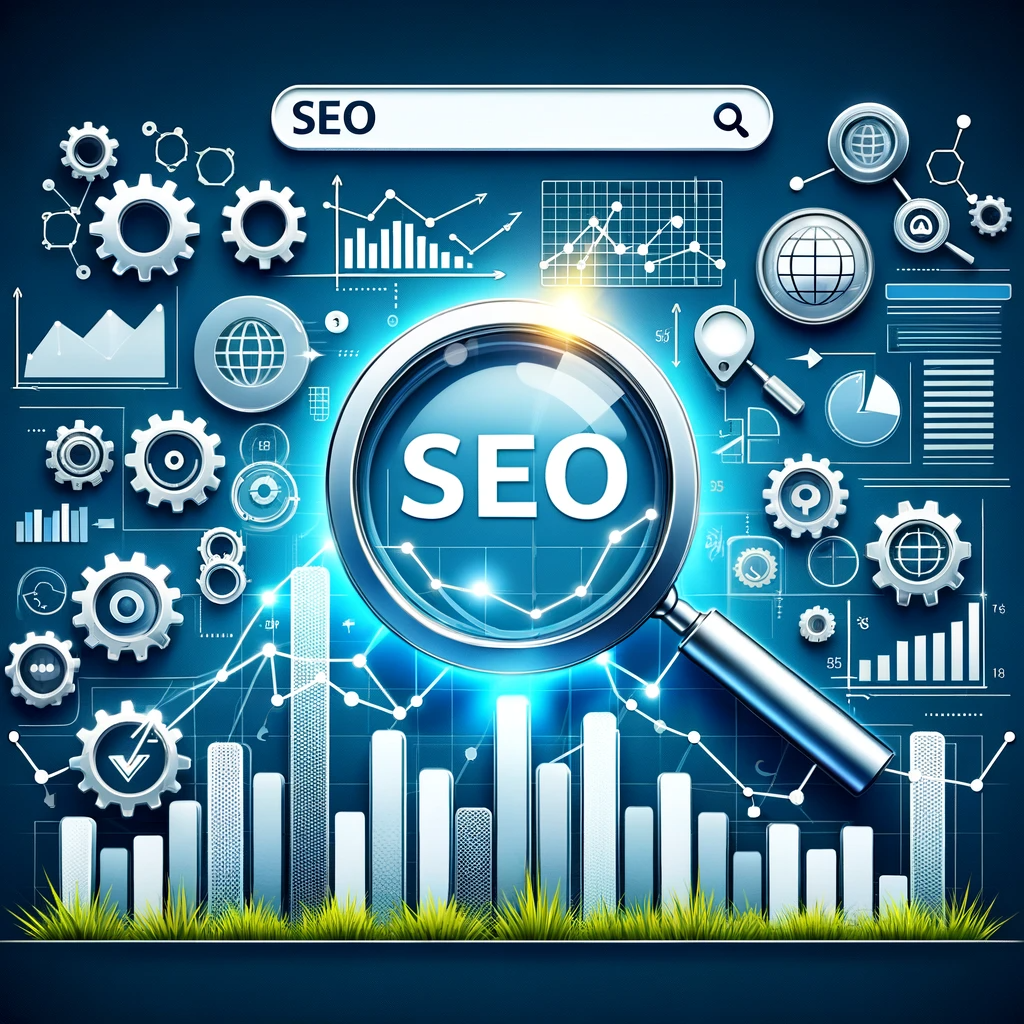
What is PPC?
PPC, or pay-per-click advertising, is a model of online marketing in which advertisers pay a fee each time their ad is clicked. Contrary to the non-paid avenues that SEO targets, PPC places ads in prominent positions, such as on the top of the search results page, ensuring immediate visibility. PPC advertising effectiveness can be measured directly through the cost associated with each click, providing advertisers with a clear picture of their return on investment.
| SEO | PPC |
|---|---|
| Targets organic search results. | Ads appear in premium ad spaces. |
| Enhances credibility and trust with users. | Provides immediate visibility to target audience. |
| Requires ongoing optimization and content creation. | Costs incurred per each click on the ad. |
| Focuses on long-term growth. | Ideal for short-term campaigns and testing. |
| Involves on-page and off-page tactics. | Uses targeted keywords for ad placement. |
| Beneficial for local SEO and capturing local clientele. | Easy to scale budget and adjust campaign settings. |
Whether it’s SEO vs PPC, both have their place in a comprehensive digital marketing plan. By combining SEO’s organic growth with PPC’s targeted approach, businesses stand to gain the most by covering all angles of search engine optimization and paid search strategies.
The Search Landscape
As digital real estate, the search landscape is continually evolving to meet the demands of users for quick, relevant, and reliable information. Within the complex framework of search engine result pages (SERPs), marketers can find a plethora of elements that make up modern search engine marketing. These include traditional organic listings, a variety of paid listings, immersive ads, informative knowledge panels, and the more recent featured snippets. Not to mention, the innovative formats like Google’s responsive search ads bring a level of dynamism to the mix, adjusting the message to suit user queries and preferences.

- Organic listings remain the bedrock of SERPs, where search engine optimization efforts culminate in earning a spot among the top results.
- Paid listings, which include a variety of ads, offer immediate visibility atop or alongside organic results, often identified with an ‘Ad’ label.
- Knowledge panels and featured snippets provide users with quick facts, definitions, or overviews, directly answering query-related questions.
The implications of these features for search engine marketing are profound. Businesses must now contend not just with other advertisers but also with a search engine’s own curated content. The key to leveraging this digital landscape lies in a brand’s ability to present its offerings at strategic points during the consumer’s research process. Whether that’s through carefully crafted featured snippets that succinctly answer common questions, or responsive search ads that adapt to user searches, the goal is to capture attention and guide decision-making at multiple touchpoints.
Ads no longer simply mean banner advertisements; they’ve grown into multi-faceted tools that include options for engaging visuals, quick calls-to-action, and even interactivity. Also, with SERPs getting more personalized, brands that successfully integrate organic and paid strategies stand to benefit from both visibility and credibility.
In the world of search engine marketing, adaptation and agility are paramount. Brands that understand the nuances of search engine result pages can navigate the complexity of paid and organic listings to optimize their online presence effectively.
SEO: Pros and Cons
In a world where the organic search engine is king, understanding the nuances of SEO is critical for driving traffic to your website without incurring the hefty cost per click of paid advertising. The ROI of SEO is not just about the numbers—it’s about the sustainable marketing practices that can build a foundation of credibility and consistent website traffic.
Pros of SEO
SEO is recognized for its profound ability to connect businesses with their audience through the power of an organic result. This connection is not just about achieving superior search rankings—it’s about creating a relationship built on trust and authority. SEO best practices leverage various SEO strategies that work toward enhancing site visibility without directly impacting marketing budgets. This provides brands with sustainable marketing solutions, drawing in lucrative website traffic through substantial search volume and carefully selected keywords.
- Sustainable traffic increases without direct cost per click.
- Higher ROI over long-term implementation.
- Improved search rankings lead to increased credibility and trust.
- Strategies persist even during marketing budget cuts, ensuring ongoing website traffic.

Cons of SEO
Despite its many benefits, SEO is not free from challenges. Any marketer will attest to the intensive competition for top search rankings, especially against brands with larger resources. In the digital arena, minor league players often find themselves batting against corporate giants, and sometimes the organic search landscape is saturated with ads that dwarf organic listings.
- Intense competition may hinder visibility.
- Organic rankings take time and effort to establish and require constant nurturing.
- Content development and link-building can be complex and challenging.
- Search algorithms are frequently updated, necessitating agile adaption in SEO tactics.
Incorporating SEO into your marketing playbook requires not just a mastery of its best practices but also a keen understanding of its inherent challenges. Its greatest strength lies in its ability to generate traffic that’s not just a quick win but a sustainable asset for your digital presence.
PPC: Pros and Cons
Pay-Per-Click (PPC) advertising, a cornerstone of modern digital marketing campaigns, is a dynamic tool that caters to businesses seeking immediate results and unparalleled exposure in the digital frontier. As effective as PPC marketing can be, like any strategic approach, it comes with its distinct set of advantages and setbacks.
Pros of PPC
One of the most compelling attributes of a PPC campaign is its capacity for instant impact. By leveraging prominent PPC platforms, advertisers can launch a targeted PPC ad and reap immediate visibility, ensuring their message reaches the intended audience swiftly. Cost per click might be a consideration, but the platform’s robust budget control features allow marketers to maintain fiscal discipline while potentially driving substantial revenue.
- Immediate exposure in paid search results
- Targeted visibility with precision
- Direct budget control mechanisms
- Valuable data for strategy refinement
- Flexibility for tactical changes and A/B testing
Cons of PPC
Yet, not all that glitters in the realm of paid advertising is gold. With each PPC ad comes a price – the competitive arenas of PPC platforms may drive the cost to dizzying heights, especially when vying for the most sought-after keywords. This cost factor positions PPC as a temporary pillar that, once the budget runs dry, crumbles, leaving no residual benefits or continued visibility, unlike organic strategies.
- Higher costs for competitive keyword targeting
- Temporary visibility linked to ongoing investment
- Marketplace bidding that can escalate budgets
Comparing SEO and PPC
As businesses allocate their marketing budgets, one key decision is the investment channel. Organic vs paid search? The answer isn’t straightforward. Comparing SEO and PPC involves multiple factors like search traffic, click-through rate (CTR), and overall return on investment (ROI).
SEO vs. PPC: Which is Better?
Debate often arises when it comes to SEO vs paid search, as both have distinct advantages. SEO tends to provide more sustained ROI over time, while PPC offers immediate results and precise targeting options. However, determining which one is better depends largely on specific marketing goals and industry benchmarks.
SEO vs. PPC: Five Questions to Ask
- What are your long-term marketing goals? Investing in SEO might be preferable for organic growth.
- How quickly do you need results? PPC can be advantageous for immediate visibility.
- What’s your marketing budget? SEO requires a front-loaded investment but diminishes costs over time.
- How competitive are your target keywords? PPC could be costly with high-competition keywords; SEO can be a strategic counter.
- Do you need granular control over your campaign? PPC allows for agile adjustments and precise targeting.
SEO vs. PPC Statistics
Making an informed decision requires looking at the data. SEO generally has a higher click-through rate, indicating users’ trust in organically ranked websites. PPC, meanwhile, excels in conversion-focused campaigns. A layered approach, using both as complementary marketing channels, often yields the best outcomes for maximizing search traffic.
Ultimately, marketers may not need to choose one over the other. A dynamic marketing strategy can involve both SEO and PPC, utilizing the strengths of each to create a robust online presence. Knowing when to use which tactic can turn a marketing budget into an optimal investment for both immediate returns and long-term growth.
Using SEO and PPC Together
Integrating SEO and PPC is a holistic approach that amplifies a brand’s digital marketing strategies. When you combine the trust-building capabilities of SEO efforts with the precision and immediacy of successful PPC, you create a synergistic force in online marketing. This integration serves as a dual-fronted strategy, targeting both organic and paid search results to yield the full spectrum of search engine visibility and customer reach.
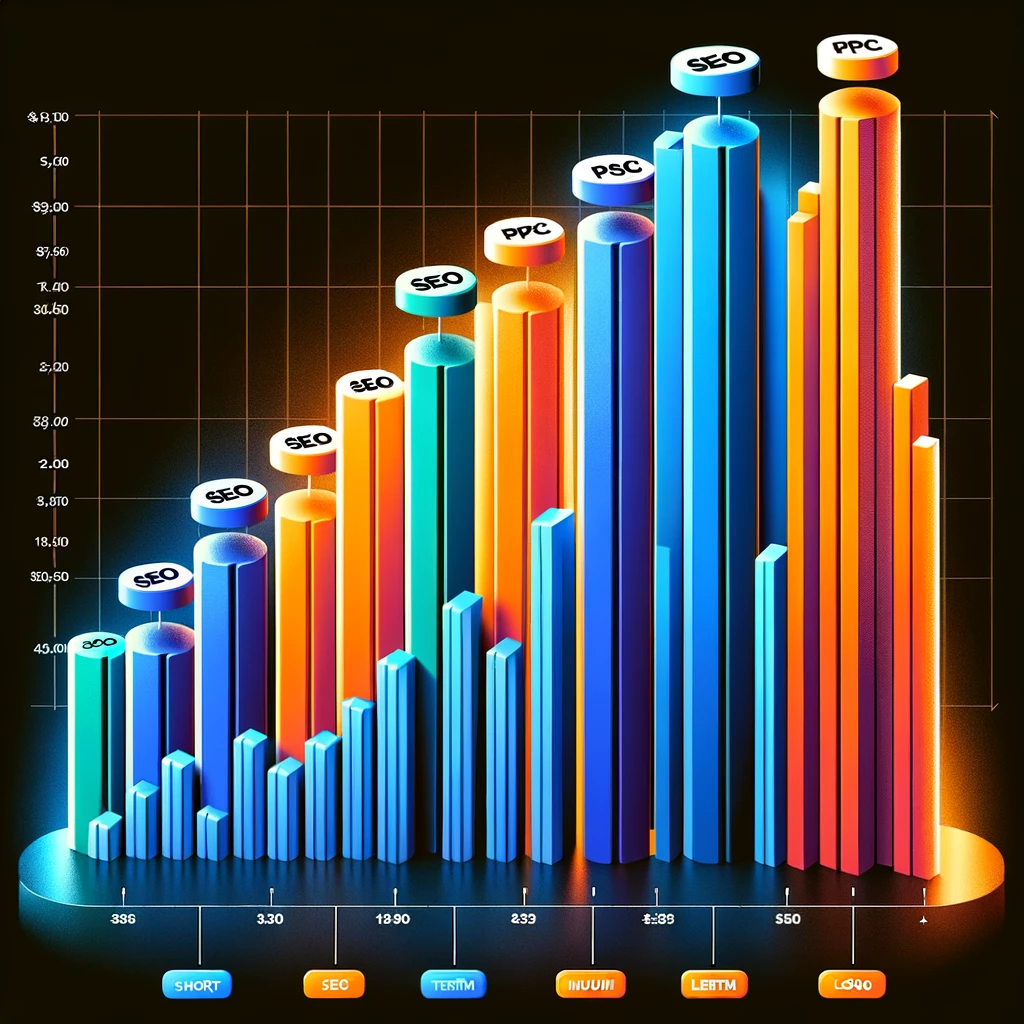
The Third Option: SEO and PPC
Often, the debate revolves around a PPC vs SEO mindset, but why settle for one when you can harness both? Combining SEO and PPC work provides a balanced approach, ensuring that your brand stands out amidst an increasingly crowded digital space. Employing these methods together ensures that, regardless of how potential customers are engaging with search engines, your brand has the opportunity to capture their attention.
SEO and PPC: The Best of Both Worlds
Understanding the complementary nature of SEO and PPC strategies can result in a multiplicative effect on a brand’s market presence. The steadfastness of SEO is perfect for building a foundational online presence, while the agility of PPC can adapt to market trends and capture leads more rapidly. When your SEO campaign benefits from the insights gained through PPC analytics, you make data-driven decisions that refine keyword targeting and optimize content.
Building an Integrated Search Engine Marketing Strategy
An integrated search engine marketing strategy defines success not only by individual channel performance but by how well SEO and PPC amplify each other. Brands looking to maximize their digital impact must adopt a framework where both channels are in constant dialogue, allowing the insights from each to bolster the overarching marketing objectives.
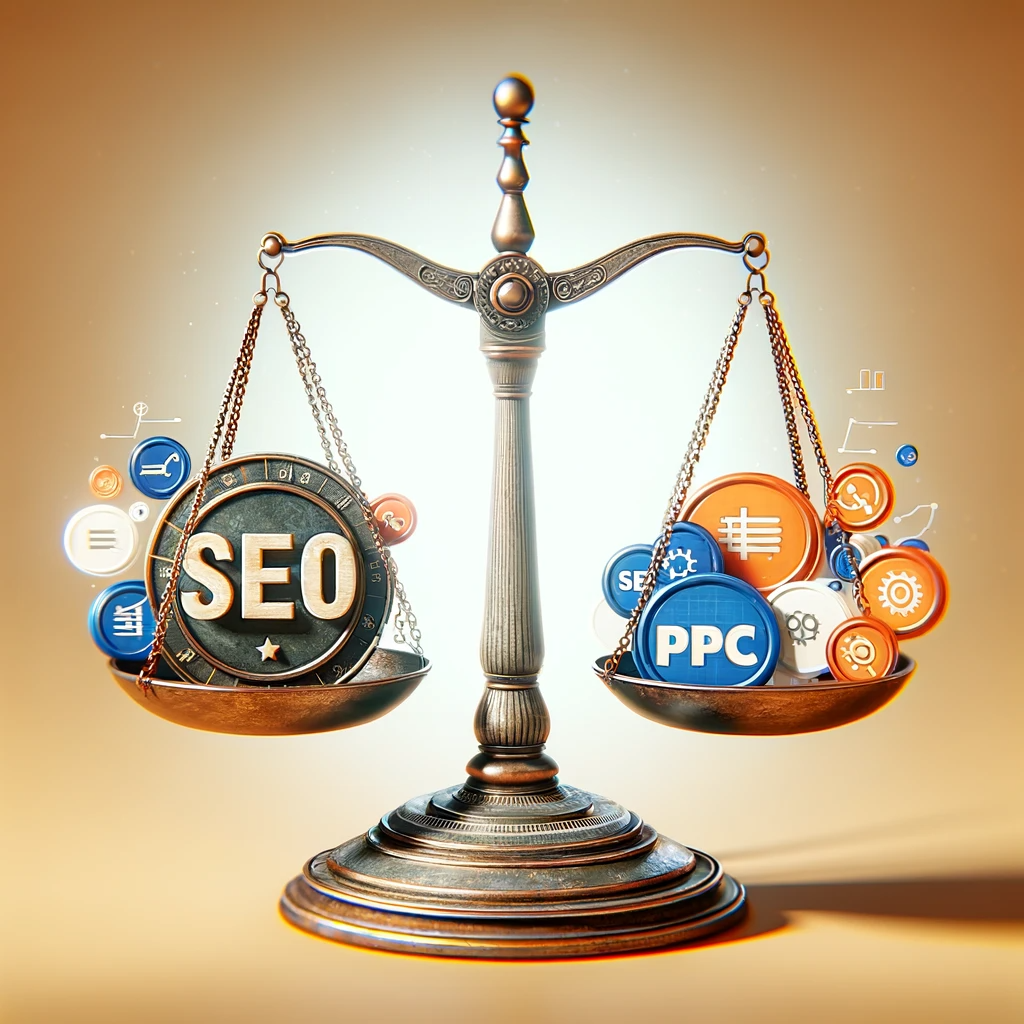
Below is an insightful table that presents a snapshot of how an integrated approach to SEO and PPC can elevate a digital marketing strategy:
| SEO Benefit | PPC Benefit | Integrated Advantage |
|---|---|---|
| Long-term organic growth | Immediate traffic boost | Balanced long-term and short-term visibility |
| Cost-effectiveness over time | Precise budget control | Optimized spend through strategic allocation |
| Increased brand credibility | Targeted ad copy for specific audiences | Enhanced trust and message personalization |
| Better CTR with high-ranking content | Ability to test keywords and ad copy rapidly | Optimization of content and messaging based on performance data |
By merging SEO and PPC, businesses lay a broad and versatile foundation for their digital marketing strategies—the result: a comprehensive online presence that caters to user search behaviors through a multi-faceted approach. As businesses evolve in the digital landscape, the fusion of SEO and PPC emerges as a sound investment into an integrated future where every click, keyword, and campaign work together seamlessly.
Final Thoughts and Recommendations
In the intricate dance of search marketing, understanding the rhythm between search engine optimization (SEO) and pay per click (PPC) can be the decisive factor in a brand’s online prominence. Striking a balance between the enduring nature of SEO and the agile responsiveness of PPC is crucial in a complex digital ecosystem. As we have navigated through the various landscapes these strategies offer, certain principles emerge as guideposts for crafting an effective search marketing approach.
When to Optimize and When to Pay for Traffic
Choosing between SEO and PPC often hinges on the immediacy of your goals and the depth of your marketing pockets. SEO is undeniably a long-term strategy, stitching authority and affinity into the fabric of your web presence. It’s the crusader of organic engagement, but patience is its silent partner. If your timeframe tilts towards ‘urgent’, or you are targeting highly competitive search terms, PPC can help vault your brand to the top of search results, albeit at a price. Ensuring that SEO lays the foundation while PPC shines a spotlight can yield a harmonious digital presence.
Key Differences Explained
Deciphering the key differences between search engine optimization vs pay per click reveals that while SEO helps to build a lasting relationship with search engines and users, PPC provides that extra thrust when immediate visibility is paramount. Search marketing thrives when these forces are not pitted against each other in a ‘SEO vs PPC which is better’ contest, but rather aligned to bolster the strengths of each other, depending on the campaign objectives and the nature of the products or services offered.
Choosing the Right Strategy Best for Your Business
With an array of strategies at your fingertips, choosing between SEO and PPC should be an informed decision. It’s essential to examine the contours of your market, the search behaviors of your demographic, and the agility of your brand in reacting to search term trends. SEO and PPC are not mutually exclusive; they are complementary elements of a cohesive digital marketing framework. The question isn’t which is better in isolation, but how each can advance your business objectives in concert.
Integrating SEO and PPC Data for Maximum Impact
Collating and analyzing data from both SEO and PPC expeditions supplies a treasure trove of insights ripe for strategic exploitation. An integrated approach ensures a panoramic view of your search landscape, equipping you with a deeper understanding of user intent and behavior. This data symbiosis can refine your messaging, enhance targeting precision, and sharpen your overall search marketing initiatives. In the end, the fusion of SEO and PPC data not only illuminates the path but also paves it with measured steps towards search engine mastery.
